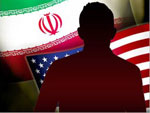 UPI: A military faceoff with Iran is less likely since threats of more sanctions and direct talks lowered the rhetoric about its nuclear plans, analysts say. United Press International
UPI: A military faceoff with Iran is less likely since threats of more sanctions and direct talks lowered the rhetoric about its nuclear plans, analysts say. United Press International
 WASHINGTON, April 30 (UPI) — A military faceoff with Iran is less likely since threats of more sanctions and direct talks lowered the rhetoric about its nuclear plans, analysts say.
WASHINGTON, April 30 (UPI) — A military faceoff with Iran is less likely since threats of more sanctions and direct talks lowered the rhetoric about its nuclear plans, analysts say.
Also, analysts and U.S. officials note there is a growing schism in Israel between political leaders and military and intelligence officials about the wisdom of attacking Iran — rather than giving diplomacy a chance to work, The New York Times reported Monday.
“I do think the temperature has cooled,” an Obama administration official said.
No one is denying, though, that the optimism could fade quickly.
PHOTOS: Iranians prepare for second round of Parliamentary Elections
“While there isn’t an agreement between the U.S. and Israel on how much time, there is an agreement that there is some time to give diplomacy a chance,” said Dennis B. Ross, who once oversaw Iran policy for the Obama administration. “So I think right now you have a focus on the negotiations. It doesn’t mean the threat of using force goes away, but it lies behind the diplomacy.”
Recent talks in Istanbul, Turkey, involving Iran, the United States and other countries could be considered a turning point in U.S. thinking about Iran, one Obama administration official said. The official told the Times Iranian negotiators seemed more open to resolving the crisis than expected, even though no agreement was reached except to meet again next month.
U.S. officials said they believe the threat of tighter economic sanctions that would be effective July 1 helped Iranian officials to be more serious about negotiations, also reducing the threat of war.
“There is a combination of factors coming on line, including the talks and the sanctions, and so now I think people realize it has to be given time to play out,” another administration official told the Times.
Iran maintains its nuclear program is for peaceful purposes, but the United States, Israel and other Western countries said they believe it is for developing nuclear weapons.
One analyst told the Times if Iran does not engage in substantive discussions about its program in Baghdad next month the crisis atmosphere may return.
“I think this could be a temporary lull,” said Paul R. Pillar, a former CIA analyst on the Middle East.
“My own expectation is that even after Baghdad we will only see the most preliminary understandings, and we will hear again people saying we are giving up too much. And the lull right now could just be a lull between the diplomatic meetings.”


